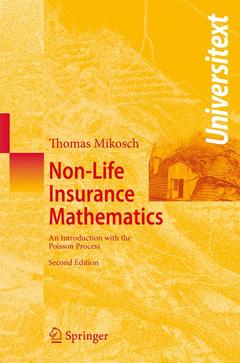Non-Life Insurance Mathematics (2nd Ed., 2nd ed. 2009) An Introduction with the Poisson Process Universitext Series
Auteur : Mikosch Thomas

Thomas Mikosch has been professor at the Laboratory of Actuarial Mathematics of the University of Copenhagen since January 2001. Before this, he held positions in Dresden (Germany), Wellington (New Zealand) and Groningen (Netherlands). His special interests are applied probability theory and stochastic processes. Over the last few years his research has focused on extremal events in finance, insurance and telecommunications. His earlier very successful book, written jointly with Paul Embrechts and Claudia Klüppelberg, Modelling Extremal Events for Finance and Insurance (1997), is also published by Springer.
Date de parution : 03-2009
Ouvrage de 432 p.
15.5x23.5 cm



